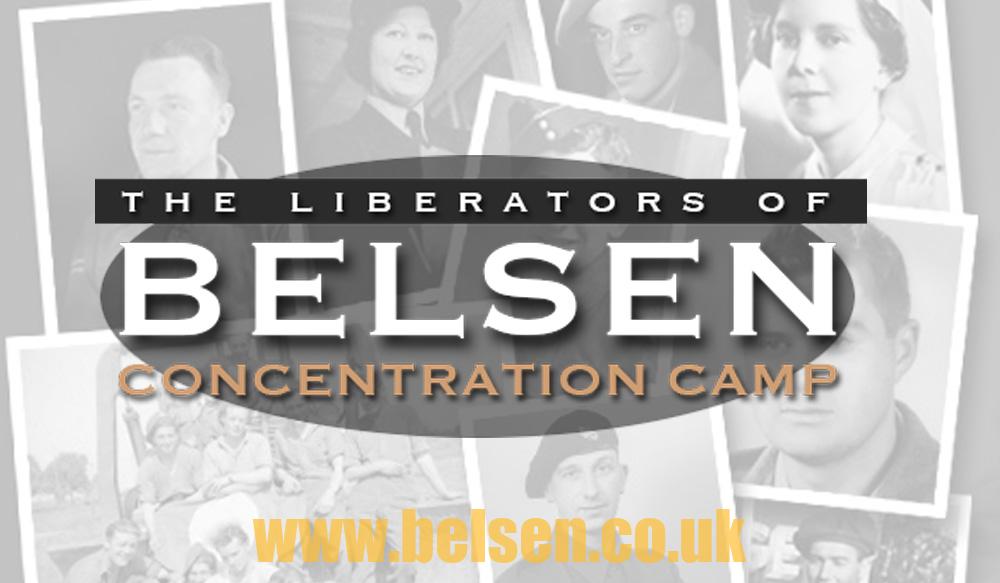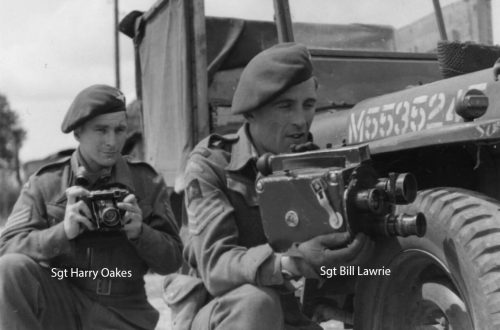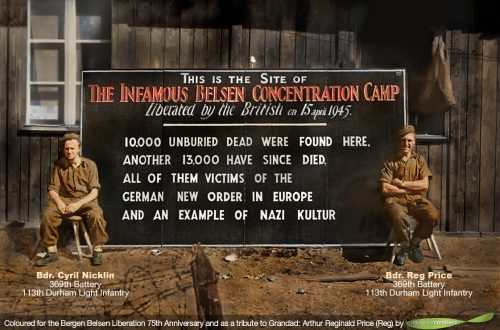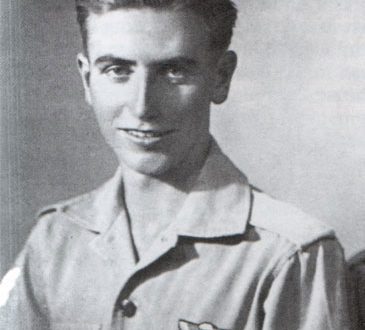Ian Forsyth and Julien Wieciech
As a young soldier in April 1945, Ian Forsyth faced the gates of Belsen concentration camp from the confines of an army tank as allied troops prepared to liberate it and for the first time in his life he understood what he was actually fighting for.

His abiding memory of the historic day when the notorious Belsen camp – where thousands of Jews died as well as Poles, Gypsies and other groups considered by the Nazis to be non-Ayrian – was liberated, is one of the smell as they approached and the horror they saw from behind the fence.
He explained: “The air was heavy with a terrible stench and we could quite literally smell death as we got closer to the camp. We could only see the prisoners who could stand, many of them were too weak to do that. Nothing could prepare us for what we saw. The inmates were ghost-like apparitions.”
The images of emaciated frames of men, women and children who had been starved and beaten forever seared on Ian’s memory. As they sat in the tank awaiting their next order, growing anger at the sight they were faced with built up between Ian and his crew who were desperate to go inside the camp and help the prisoners.
But, as the convoy of British soldiers numbered less than 80 and armed German guards were still patrolling the Belsen prisoners, the decision was taken to pull back and allow the advancing intelligence and medical corps to take control of the camp and take the German soldiers prisoner.
Ian said: “On reflection, it was the best decision. If we had gone inside we would probably have shot the German guards there and then as our anger would have been uncontrollable. As we were not medically trained, our instincts would also have been to give the inmates whatever rations we had and that would most likely have killed them, given the length of time they had gone without food.”
Unknown to Ian, his chance to extend the hand of friendship to one of the inmates would come – more than 50 years later. As the soldier and his fellow tank crews were in position and at the ready outside the gates, inside the camp, Polish prisoner Julian Wieciech, was fighting his own battle for life.
Weighing less than seven stones Julian, a member of Poland’s underground army, had heard the British tanks advancing the evening before and, despite the fact he was close to death, had taken strength from the hope of imminent freedom. Amazingly, he pulled through the night to see the camp liberated on his 18th birthday.
Ian explained: “When the medics found him they reckoned he only had about 10 minutes to live. But he was tough and managed to hang on”.
In an astonishing coincidence, the two men met for the first time nine years ago when Julian’s son, who was the Polish consul-general in Scotland at the time, met Ian at a service in Clydebank to commemorate the men who had died on board a Polish ship sunk during the war.
Ian said: “I was wearing a forget-me-knot badge and he asked me why. I told him it was to remember the Jewish immigrants who died in Belsen. He told me his father had been an inmate there and, following conversations with him, he arranged for his father to come over to Scotland.”
Ian described that meeting as very emotional. “We spoke about Belsen and, by talking with him I felt something good had come out of it. He told me if we hadn’t arrived when we did, his children would never have been born.”
The day after Belsen was liberated Ian also had his own brush with death when his tank was hit by a shell – the third time he had been on board a tank when it was hit. He said: “It burst into flames. Fortunately for me, I was on the far side of where it took the hit but, as we were getting out, it was hit by a second shell.”
Amazingly, Ian escaped without a serious injury but not all of his crew were as fortunate. For the former wireless operator, the loss of fellow soldiers he had built up strong friendships with was one of the hardest parts of the war to deal with. Ian said: “The things we went through have had a profound effect on my life.”
For Ian, his wartime memories of living ‘an animal-like existence’, holed up in the ground for days on end in darkness and freezing temperatures, do not fade as the years go by.
“During the day it’s not so bad and you go about your business but at night it still haunts me,” he explained.
After the war, Ian was sent to Palestine with the army before returning to Hamilton in 1948, where he married and became a teacher. Twenty years ago he returned to Belsen to find the horrific images of the war have been replaced by peaceful poignancy.
He said: “The only thing left were the grassy mounds that have grown over the mass graves, but I was glad I had made the trip back to answer some of the questions I had in my mind.
“I believe we have to remember these things because, if they’re forgotten, we face the danger of the next generation going through the same thing again.”
10,811 total views



